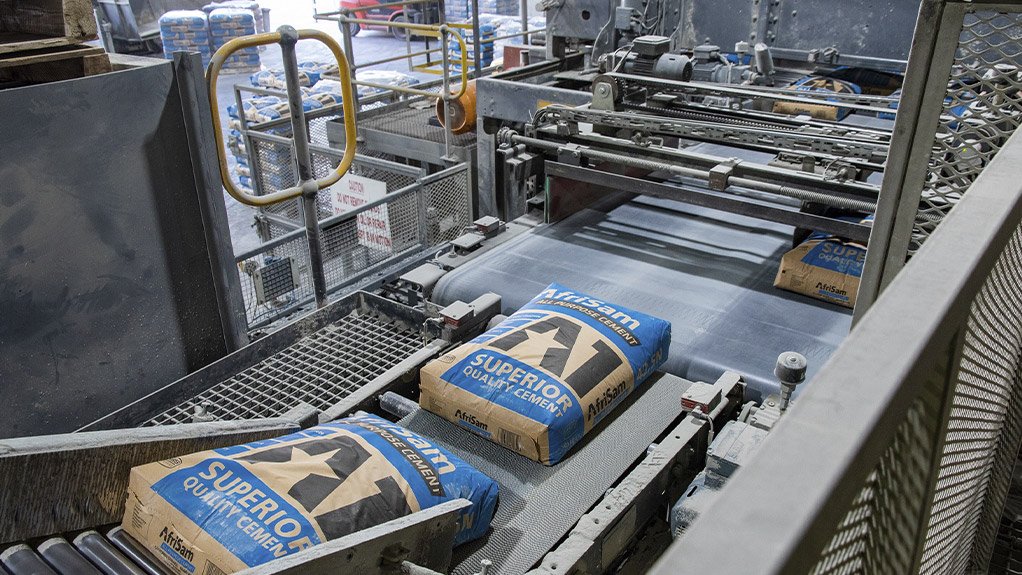AfriSam's composite cements lead in sustainability drive


Energy consumed in producing composite cements can be 20 to 25% less than Ordinary Portland Cement (OPC), of the same strength class
This article has been supplied as a media statement and is not written by Creamer Media. It may be available only for a limited time on this website.
Leading the market in reducing clinker content in its composite cements, AfriSam has been a trailblazer in cutting carbon emissions in one of the economy’s most energy-intensive sectors.
Hannes Meyer, executive cementitious at AfriSam, highlights that the energy consumed in producing ordinary Portland cement (OPC) can be 20 to 25% higher than a composite cement, of the same strength class, containing a cementitious extender.
“This results from the added cost of producing a higher percentage clinker at high temperatures used per tonne of composite cement manufactured,” says Meyer. “Extenders like fly-ash or ground granulated blast furnace slag (GGBFS) can be blended into the mix, reducing the amount of clinker milling required per tonne of cement.”
This has more recently become a focus for other players in the market, even those who had previously not embraced the concept of composite cement, he notes. AfriSam has in the meantime become the benchmark for these cement innovations, along with a range of sustainability initiatives to monitor and reduce carbon emissions.
“A vital aspect of our use of extenders has been our ability to activate these materials for greater reactivity,” he says. “Through evolving our chemical and mechanical activation methods, we achieve a more reactive product – allowing us to progressively replace more and more clinker while retaining high cementitious quality and strength performance.”
In another stream of the company’s research, it has taken strides in developing the reactivity of clinker itself. By changing the mineralogy of clinker, its reactivity can be improved. Meyer points out that cement blending companies have already recognised the high reactivity of AfriSam cement, with many of them preferring AfriSam’s products as they ‘go further’ in a blending application.
“We have also had great success in the use of grinding aids in our milling processes, collaborating closely with specialist firms to address our exacting requirements,” says Meyer. “These grinding aids are specific to the extenders we use, helping to improve reactivity and in some instances adding 10% to 15% early strength enhancement.”
The end result is that less clinker needs to be produced per tonne of final product, he emphasises, leading to less carbon dioxide being generated. The company has also become more efficient in the use of thermal and electrical energy in its processes. Whereas electricity used to be a minor cost in cement plants, it is now a major factor in cement manufacture. In this context, AfriSam has explored alternative fuels, which have become a major focus for many cement producers globally.
“We have made progress with responsibly disposing of waste products in our energy generation strategies, and we hope that government will take the necessary steps to allow us to expand these initiatives,” he says.
This includes the combustion of waste tyres and industrial carbon sludge, using high-efficiency multi-channel burners that reduce hazardous emissions. He says the employment of increasingly sophisticated process control technology is also part of the ‘AfriSam Way’ towards a sustainable planet.
Comments
Press Office
Announcements
What's On
Subscribe to improve your user experience...
Option 1 (equivalent of R125 a month):
Receive a weekly copy of Creamer Media's Engineering News & Mining Weekly magazine
(print copy for those in South Africa and e-magazine for those outside of South Africa)
Receive daily email newsletters
Access to full search results
Access archive of magazine back copies
Access to Projects in Progress
Access to ONE Research Report of your choice in PDF format
Option 2 (equivalent of R375 a month):
All benefits from Option 1
PLUS
Access to Creamer Media's Research Channel Africa for ALL Research Reports, in PDF format, on various industrial and mining sectors
including Electricity; Water; Energy Transition; Hydrogen; Roads, Rail and Ports; Coal; Gold; Platinum; Battery Metals; etc.
Already a subscriber?
Forgotten your password?
Receive weekly copy of Creamer Media's Engineering News & Mining Weekly magazine (print copy for those in South Africa and e-magazine for those outside of South Africa)
➕
Recieve daily email newsletters
➕
Access to full search results
➕
Access archive of magazine back copies
➕
Access to Projects in Progress
➕
Access to ONE Research Report of your choice in PDF format
RESEARCH CHANNEL AFRICA
R4500 (equivalent of R375 a month)
SUBSCRIBEAll benefits from Option 1
➕
Access to Creamer Media's Research Channel Africa for ALL Research Reports on various industrial and mining sectors, in PDF format, including on:
Electricity
➕
Water
➕
Energy Transition
➕
Hydrogen
➕
Roads, Rail and Ports
➕
Coal
➕
Gold
➕
Platinum
➕
Battery Metals
➕
etc.
Receive all benefits from Option 1 or Option 2 delivered to numerous people at your company
➕
Multiple User names and Passwords for simultaneous log-ins
➕
Intranet integration access to all in your organisation

















